My Dog Ate Coconut Oil: What Should I Do? Immediate Actions and Preventive Measures
It’s a beautiful Saturday afternoon, and you’ve just finished a rejuvenating coconut oil treatment for your hair. You feel revitalized, but as you’re about to clean up, you discover your furry friend has devoured a fair amount of your precious coconut oil. Naturally, panic sets in, and you wonder: what should I do now?
You’re not alone in this predicament—many dog owners have faced a similar situation. Before we dive into the steps you should take, it’s important to recognize that coconut oil itself is not toxic to dogs. In fact, some dog owners even feed their pups a small amount of coconut oil as a supplement.
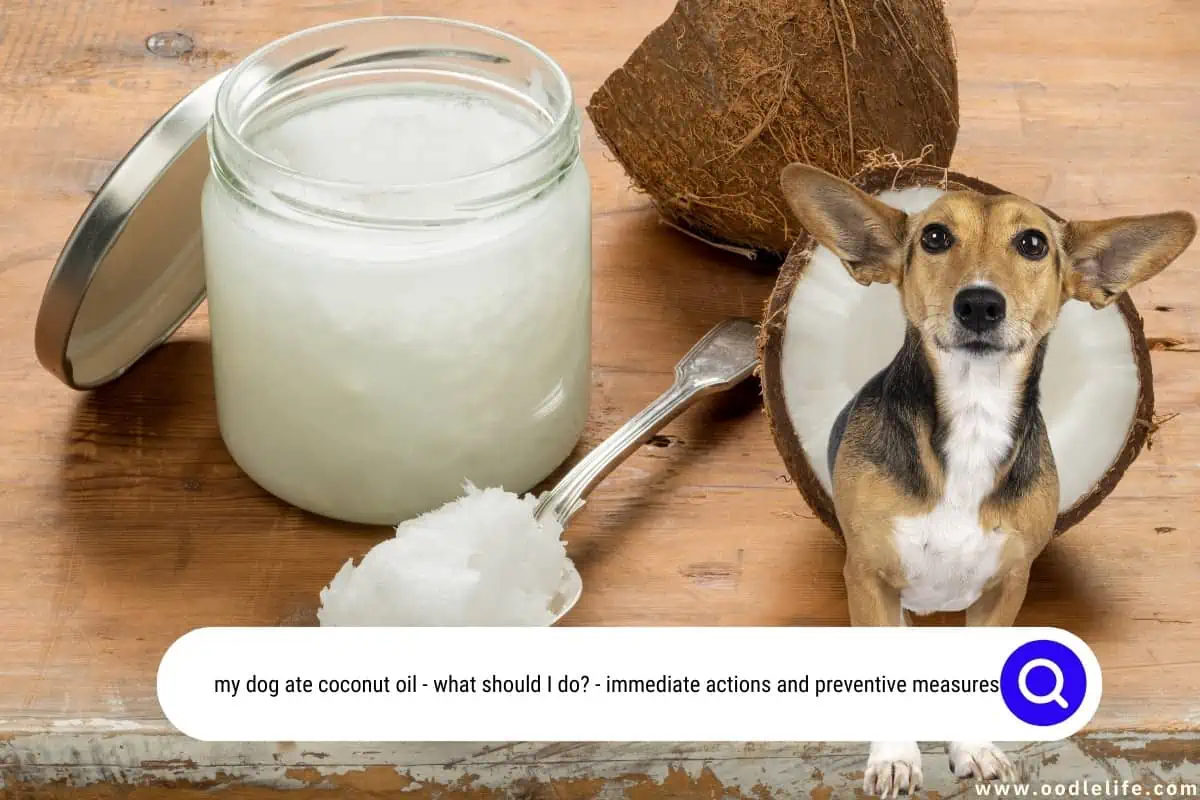
However, if your dog ate a large quantity, it could cause digestive issues or other health concerns.
So, take a deep breath and let’s walk through what you should do when your dog has overindulged in coconut oil. Remember to stay calm and keep an eye on your pup, as they may not be as comfortable as you are after that soothing hair treatment.
Understanding Coconut Oil’s Effect on Dogs
Coconut oil has become quite popular among humans in recent years, and you might be wondering if it’s safe for your furry friend. Generally, coconut oil is considered safe for dogs in smaller quantities. It contains medium-chain fatty acids, like lauric acid, which can provide some health benefits, such as improving the skin and coat, boosting the immune system, and aiding digestion.
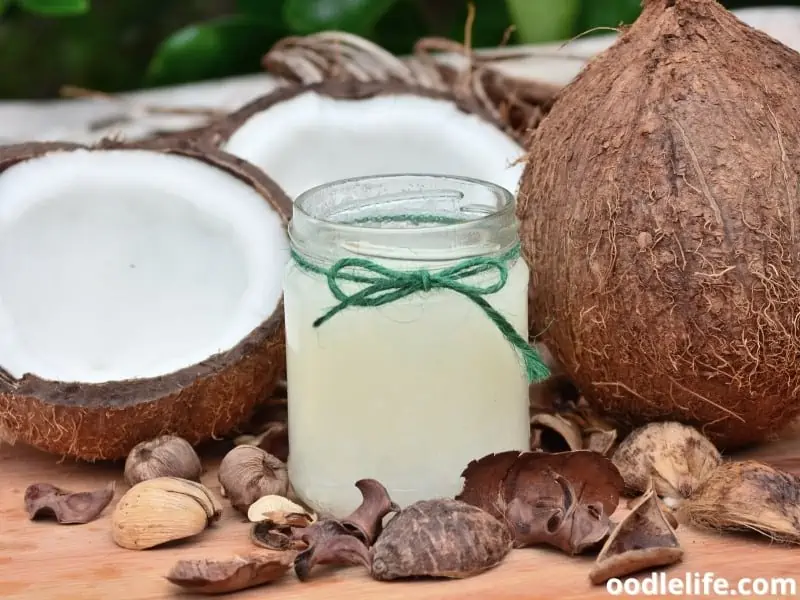
However, like most things in life, moderation is key when it comes to your dog and coconut oil. Too much coconut oil can lead to digestive issues like diarrhea or vomiting, especially if your dog isn’t used to it. Remember, every dog is different, and your pooch may have a unique reaction to this trendy oil.
So, your dog ate some coconut oil – what now? First, take a deep breath. In most cases, a small amount of coconut oil shouldn’t cause any severe issues for your dog. Observe your dog for any signs of discomfort, such as diarrhea, vomiting, or lethargy. If these symptoms persist or worsen, consult your veterinarian for advice.
To avoid future mishaps, it’s crucial to store coconut oil and other edible items in a secure place, away from your dog’s curious snout. If you decide to introduce coconut oil into your dog’s diet, consult your veterinarian to determine the appropriate dosage based on your pet’s size, age, and health conditions.
Remember, when it comes to your dog’s health, it’s always better to err on the side of caution. By being knowledgeable about your dog’s dietary needs, you’ll be able to give them the care they deserve.
Commonly Noticed Symptoms After Ingestion
Oh no! Your dog ate coconut oil, and you’re wondering what to do next. Fret not; let’s discuss some commonly noticed symptoms your canine companion may exhibit after ingesting coconut oil.

First and foremost, you might notice your furry friend experiencing diarrhea. Coconut oil has a laxative effect, and when your dog consumes it in excess, it could lead to a series of bathroom emergencies. While unpleasant, this isn’t usually cause for panic, but you should keep an eye on them to ensure it doesn’t become severe or prolonged.
Another possible symptom is vomiting. If your dog’s body does not agree with the sudden influx of coconut oil, they may regurgitate their meal. Be sure to keep an eye on your pet and make sure they are properly hydrated if they’re vomiting due to oil ingestion.
Thirdly, it’s not uncommon for dogs to feel a bit lethargic after consuming coconut oil. Coconut oil is rich in fatty acids, which can cause their energy levels to dip temporarily. Don’t be surprised if your normally-energetic pup wants to take an extra nap or two.
Finally, watch for signs of stomach discomfort. You know your dog well; look out for indications that they’re in distress, such as whining, pacing, or excessive drooling. Pain or discomfort could be a sign that the coconut oil hasn’t settled well in their tummy.
These symptoms may vary depending on the amount of coconut oil consumed and your dog’s specific reaction to it. Keep in mind that, though it might be tempting to panic, it’s essential to remain calm and observe your pet for signs of severe reactions. If symptoms become unmanageable or persist for a prolonged period, don’t hesitate to reach out to your veterinarian for help.
Critical Actions to Take
So, your dog just had a taste of coconut oil, and panic is setting in. Fear not, fellow dog parent; we’ve got your back! Just breathe and follow these crucial steps to make sure your furry friend stays in tip-top shape.
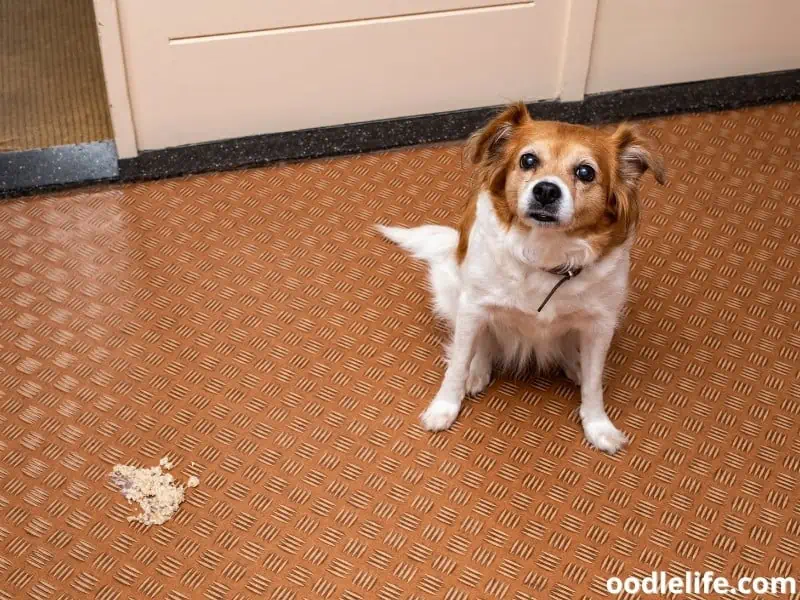
First and foremost, assess the situation. How much coconut oil did your dog consume? A lick or two isn’t cause for alarm; in fact, coconut oil can be beneficial for dogs in small doses.
However, if Fido devoured a substantial amount, keep reading.
Next, keep an eye out for any signs of distress from your pup. Coconut oil acts as a laxative and can cause diarrhea, especially if consumed in large quantities. If you notice any upset stomach symptoms — vomiting, dehydration, or continuous bathroom trips — it’s crucial to take your dog to the vet immediately.
While waiting for your appointment, ensure your dog stays well-hydrated. Offer plenty of water, and, if possible, add some electrolyte-rich liquid to the bowl. This can help to replenish any lost fluids from diarrhea and maintain your dog’s hydration levels.
In the meantime, when (and only when) your vet gives the all-clear, you can provide some bland food to help settle your dog’s stomach. Foods like boiled chicken and rice are excellent, easy-to-digest options that will give your dog much-needed nourishment without overwhelming their system.
Lastly, prevention is key. Be mindful of where you stash your coconut oil and other tempting treats — yes, even items like trash bags and toothpaste tubes are not immune to a curious dog’s jaws. Remember, an ounce of prevention is worth a pound of (coconut-oil-induced) cure.
And that’s it! Follow these critical actions, and you’ll have your canine companion back on their paws in no time. Stay vigilant, keep calm, and carry a pooper scooper.
Medical Intervention Needed
If your dog ate coconut oil, don’t panic! In many cases, small amounts of coconut oil are not harmful to dogs. However, depending on the amount ingested, you may need to take action.
Assessing the Situation
First, determine how much coconut oil your dog ate and consider your dog’s size. For a smaller dog, a teaspoon of coconut oil might cause an upset stomach, while larger dogs might not show any symptoms.

In any case, keep an eye on your dog for the following signs:
- Vomiting
- Diarrhea
- Lethargy
- Abdominal pain
Calling Your Vet
If your dog shows any of the aforementioned symptoms, it’s time to get in touch with your veterinarian. Describe how much coconut oil your dog consumed, your dog’s size, and the symptoms being exhibited. Your vet will provide guidance on whether or not medical intervention is necessary.
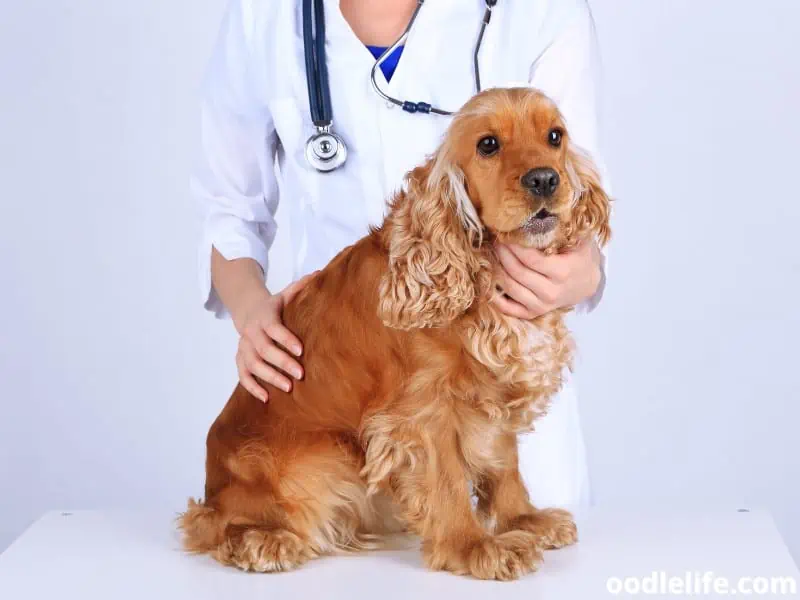
Home Care Tips
If medical intervention is not required, follow these tips to help your dog recover from consuming coconut oil:
- Provide fresh water to prevent dehydration.
- Monitor your dog for any changes in their behavior or symptoms.
- Offer a bland diet (such as boiled chicken and rice) to soothe their stomach.
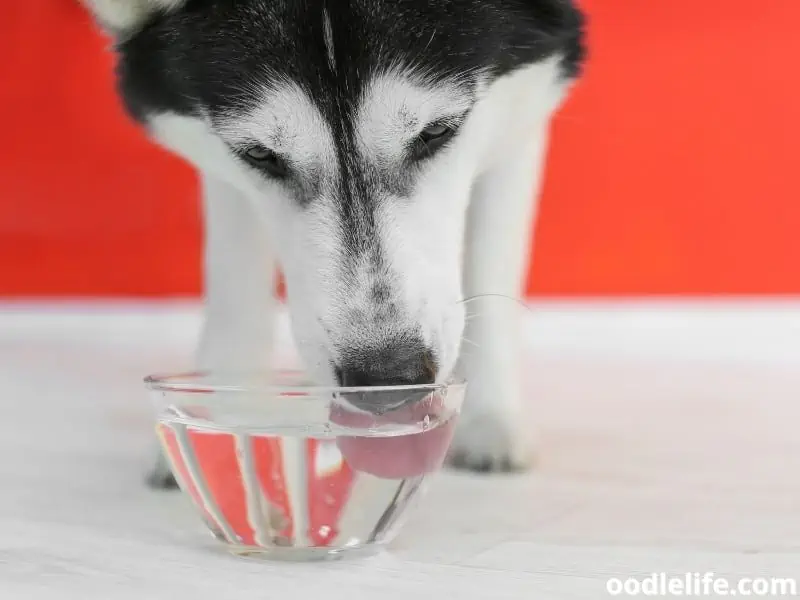
Remember that dogs will be dogs and sometimes they’ll snack on something they shouldn’t. Keep an eye on what your pup is eating, but rest assured that the occasional consumption of coconut oil may not require drastic measures. As always, when in doubt, consult with your vet for the best course of action.
Consequences of Ingestion
So, your dog just ate some coconut oil. Don’t panic. First, it’s important to consider the amount of coconut oil your furry friend ingested.

While it’s generally harmless in small amounts, too much can cause some troubling side effects.
For instance, coconut oil is high in fat, which could lead to gastrointestinal upset in your dog. This may include diarrhea or vomiting. If your dog has a sensitive stomach, keep an eye out for these signs.
It’s like that time your dog had a little too much leftover turkey, and well, you remember the mess.
Another concern is pancreatitis, which is an inflammation of the pancreas. This can occur if your dog regularly consumes large amounts of high-fat foods like—you guessed it—coconut oil. Pancreatitis can be painful and lead to additional complications.
It’s safe to say you should avoid turning your dog into a coconut oil aficionado.
So, what should you do if your dog ate coconut oil?
First, take a deep breath and assess the situation. How much did they eat? Was it a small lick, or did they decide the jar was their new favorite snack?
If it was just a small amount, take note of any changes in their behavior and consult your vet if you’re concerned.
In case your dog devoured more than its fair share, don’t hesitate to call your veterinarian for advice. They’re the experts, after all. They might recommend you keep an eye on your dog or even bring them in for a checkup depending on the circumstances.
Remember, with any dog-related dietary situation, your best bet is to be observant and consult with your veterinarian if you have concerns. Just like giving them a taste of your kale smoothie, it’s better to be safe than sorry (even if they loved it!).
Preventive Measures
It’s great that you’re taking steps to understand the effects of coconut oil on your furry friend. To prevent any mishaps in the future, let’s discuss some preventive measures.

Be Mindful of Storage: First and foremost, store your coconut oil in a secure place, out of your dog’s reach. You know how curious they can be – it’s like they have a sixth sense for finding tasty treats!
Awareness is Key: Always be aware of what your dog can access in your home. Keep an eye on them, especially when cooking or using coconut oil for other purposes. A short lapse in attention could lead to an unwanted feast for your pooch.
Training and Discipline: Investing some time in teaching your dog basic commands like “leave it” can prove very helpful. Consistent training can help establish boundaries and discourage unwanted behavior, like going after your precious jar of coconut oil.
Monitor their Diet: A healthy diet is crucial for your furry companion. Ensure that their meals are balanced and appropriate for their needs. Remember, not all human foods are safe for dogs, so it’s best to be cautious.
Consider a Slow Introduction: If you believe that coconut oil could benefit your dog’s health, consult your veterinarian. They can recommend appropriate amounts and safety measures to gradually introduce coconut oil to your dog’s diet, minimizing any risk of overconsumption.
By following these preventive measures, you can protect your canine friend from the potential hazards or digestive issues associated with consuming coconut oil. After all, we want the best for our loyal companions!
Conclusion
In this article, we discussed what to do if your dog ate coconut oil. As a responsible pet owner, it’s important to monitor your dog’s behavior and health closely after ingesting coconut oil.
Keep an eye on your furry friend for any signs of upset stomach, diarrhea, or vomiting. These can be temporary side effects as your dog’s body processes the oil. Make sure to provide access to plenty of fresh water to help your dog stay hydrated.
If your dog shows severe symptoms or they persist for more than a day, it’s time to consult your veterinarian. They can provide further guidance, proper treatment, and reassurance for you and your furry companion. Remember, it’s always better to be safe than sorry when it comes to your pet’s health.
While coconut oil may have some health benefits for dogs when used in moderation, keep it stored safely, so these mishaps are less likely to occur. After all, we know our canine companions can have an uncanny ability to get into things they shouldn’t.
Finally, keep in mind that every dog is different, and reactions to ingesting coconut oil can vary. As always, if in doubt, consult with a professional for the best advice tailored to your dog’s specific needs.